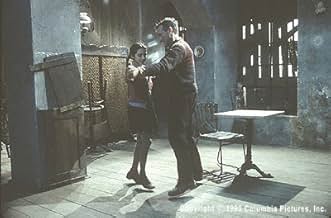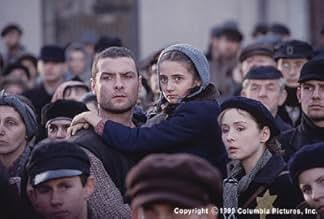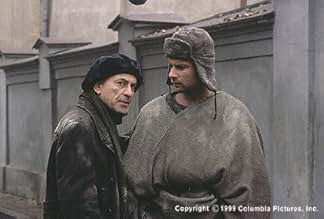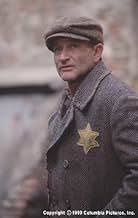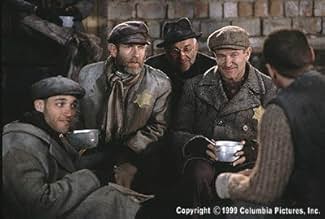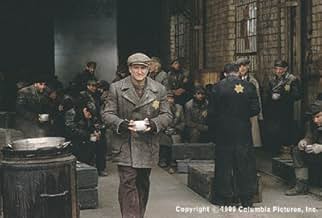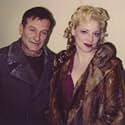During World War II, an ordinary inhabitant of a ghetto fakes news about Allied offensives to inspire hope for other victims of the Nazi regime.During World War II, an ordinary inhabitant of a ghetto fakes news about Allied offensives to inspire hope for other victims of the Nazi regime.During World War II, an ordinary inhabitant of a ghetto fakes news about Allied offensives to inspire hope for other victims of the Nazi regime.
- Awards
- 2 wins & 3 nominations
Éva Igó
- Lina's Mother
- (as Eva Igo)
István Bálint
- Lina's Father
- (as Istvan Balint)
János Gosztonyi
- Samuel
- (as Janos Gosztonyi)
Ádám Rajhona
- The Whistler
- (as Adam Rajhona)
Péter Rudolf
- Roman
- (as Peter Rudolf)
- Director
- Writers
- All cast & crew
- Production, box office & more at IMDbPro
Storyline
Did you know
- TriviaThis movie and its 1974 predecessor were both based on the novel "Jakob der Lügner", written in 1969 by the East German author Jurek Becker. As Jews, Becker and his parents were placed in a Polish Ghetto in 1939. In order to save him from deportation, his parents gave the Germans a false birth date; Becker forgot his real birth date and was never able to discover it later in life. Although he was eventually sent to the concentration camps Ravensbrück and Sachsenhausen, both he and his father survived the war; his mother died of malnutrition after being freed from the camp. His novel "Jakob der Lügner" won the Heinrich-Mann Prize for literature in 1971; Becker died in 1997 of cancer.
- GoofsAt the beginning of the film, when Jakob starts chasing the paper, it is clearly light outside, even though it is 7:30 pm in the winter in Poland. Then, 25 minutes later, when Jakob told to go to the police building, it is quite dark. In the winter, the sun would have completely set hours before.
- Quotes
[first lines]
Jakob Heym: Hitler goes to a fortune-teller and asks, "When will I die?" And the fortune-teller replies, "On a Jewish holiday." Hitler then asks, "How do you know that?" And she replies, "Any day you die will be a Jewish holiday."
- Crazy creditsSpecial thanks to the city and peoples of Piotrków, Poland, the city and peoples of Lódz, Poland and the city and peoples of Budapest, Hungary.
- ConnectionsFeatured in Siskel & Ebert: American Beauty/Blue Streak/For Love of the Game (1999)
- SoundtracksBeer Barrel Polka (Roll Out The Barrel)
Written by Lew Brown, Wladimir A. Timm (as Wladimir Timm), Jaromir Vejvoda & Vasek Zeman
Performed by The Andrews Sisters
Courtesy of MCA Records
By Arrangement with Universal Music Special Markets
Featured review
Personally, I found very touching & heart wrenching this story of one man's efforts to lift spirits in a World War II Jewish ghetto in Poland. Many have compared it to Life is Beautiful, and there are some similarities. I can understand why some viewers take offense at any film which might seem to trivialize the Holocaust, but I found Life is Beautiful not disrespectful but deeply moving, and consider this particular tale to be a captivating depiction of one individual's unique attempt to keep hope alive in a desperate situation.
The story revolves around a lonely Polish shopkeeper & widower, Jakob, who is confined to a Jewish ghetto in 1944. When summoned to ghetto headquarters for being out after curfew, he hears a radio report about Russian troop movements. To prevent a friend's suicide, he claims to have heard on his radio that the Russians are very close (within a few hundred kilometers) and will liberate the ghetto soon, causing rumours that Jakob has a secret radio. Instead of telling the truth, he tries to lift spirits and impart hope to the war weary & depressed ghetto inhabitants by maintaining the fiction of possessing this radio, and regularly disseminating uplifting fictional news bulletins about the Allies' progress. Meanwhile, Jakob is also hiding a young Jewish girl who escaped from a camp transport. The Germans hear reports of this forbidden radio and are seeking out the resistance operator of it.
Robin Williams dominates this movie and is brilliant as usual in the endearing, sympathetic role of the kind Jakob who must try to balance getting out lots of hopeful (if fictitious) war reports to keep spirits up while at the same time avoid Nazi suspicion and detection.
The movie portrays the despair of the ghetto's inhabitants and the grave injustice of their captive state. For example, Jewish people are prohibited from practicing medicine and a cardiologist is reduced to cleaning toilets, though does so with good humour, grace, and dignity. On the whole it is a very poignant tale, with any humour having a sad note to it. Jakob the Liar shows another tragic aspect of the Holocaust. Rather than the horrors of the concentration camps that are often the setting of such stories, here we see the injustice and despair of prolonged ghetto captivity.
The story revolves around a lonely Polish shopkeeper & widower, Jakob, who is confined to a Jewish ghetto in 1944. When summoned to ghetto headquarters for being out after curfew, he hears a radio report about Russian troop movements. To prevent a friend's suicide, he claims to have heard on his radio that the Russians are very close (within a few hundred kilometers) and will liberate the ghetto soon, causing rumours that Jakob has a secret radio. Instead of telling the truth, he tries to lift spirits and impart hope to the war weary & depressed ghetto inhabitants by maintaining the fiction of possessing this radio, and regularly disseminating uplifting fictional news bulletins about the Allies' progress. Meanwhile, Jakob is also hiding a young Jewish girl who escaped from a camp transport. The Germans hear reports of this forbidden radio and are seeking out the resistance operator of it.
Robin Williams dominates this movie and is brilliant as usual in the endearing, sympathetic role of the kind Jakob who must try to balance getting out lots of hopeful (if fictitious) war reports to keep spirits up while at the same time avoid Nazi suspicion and detection.
The movie portrays the despair of the ghetto's inhabitants and the grave injustice of their captive state. For example, Jewish people are prohibited from practicing medicine and a cardiologist is reduced to cleaning toilets, though does so with good humour, grace, and dignity. On the whole it is a very poignant tale, with any humour having a sad note to it. Jakob the Liar shows another tragic aspect of the Holocaust. Rather than the horrors of the concentration camps that are often the setting of such stories, here we see the injustice and despair of prolonged ghetto captivity.
- How long is Jakob the Liar?Powered by Alexa
Details
Box office
- Budget
- $45,000,000 (estimated)
- Gross US & Canada
- $4,956,401
- Opening weekend US & Canada
- $2,056,647
- Sep 26, 1999
- Gross worldwide
- $4,956,401
Contribute to this page
Suggest an edit or add missing content




